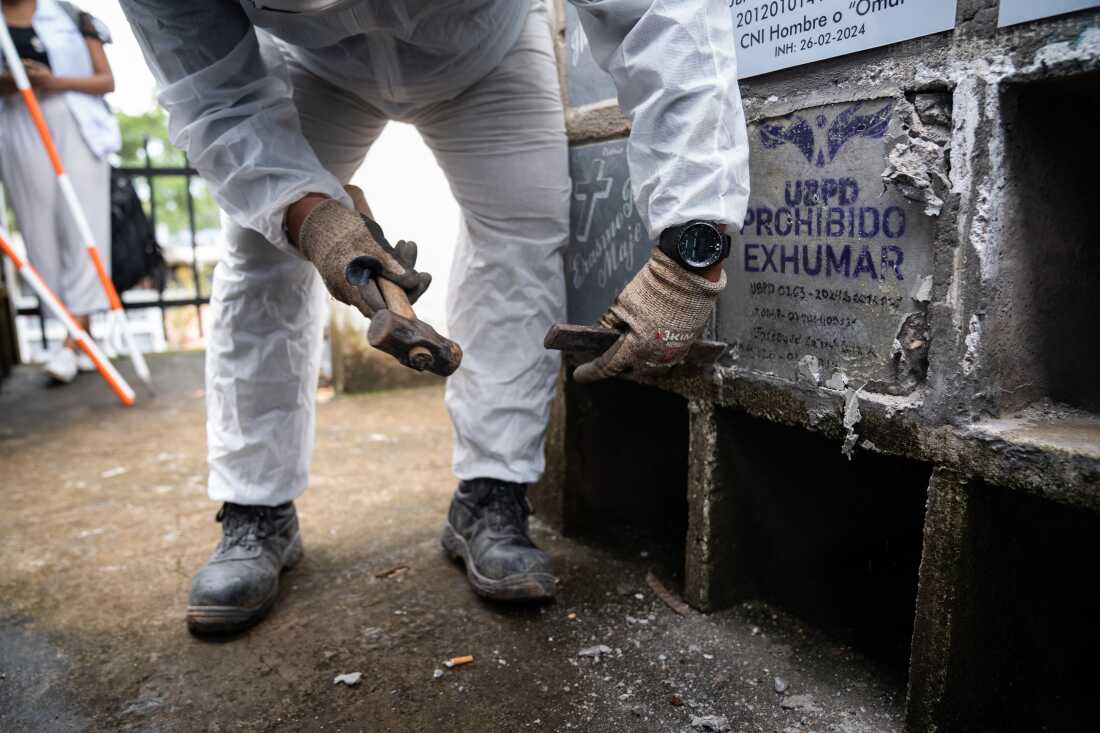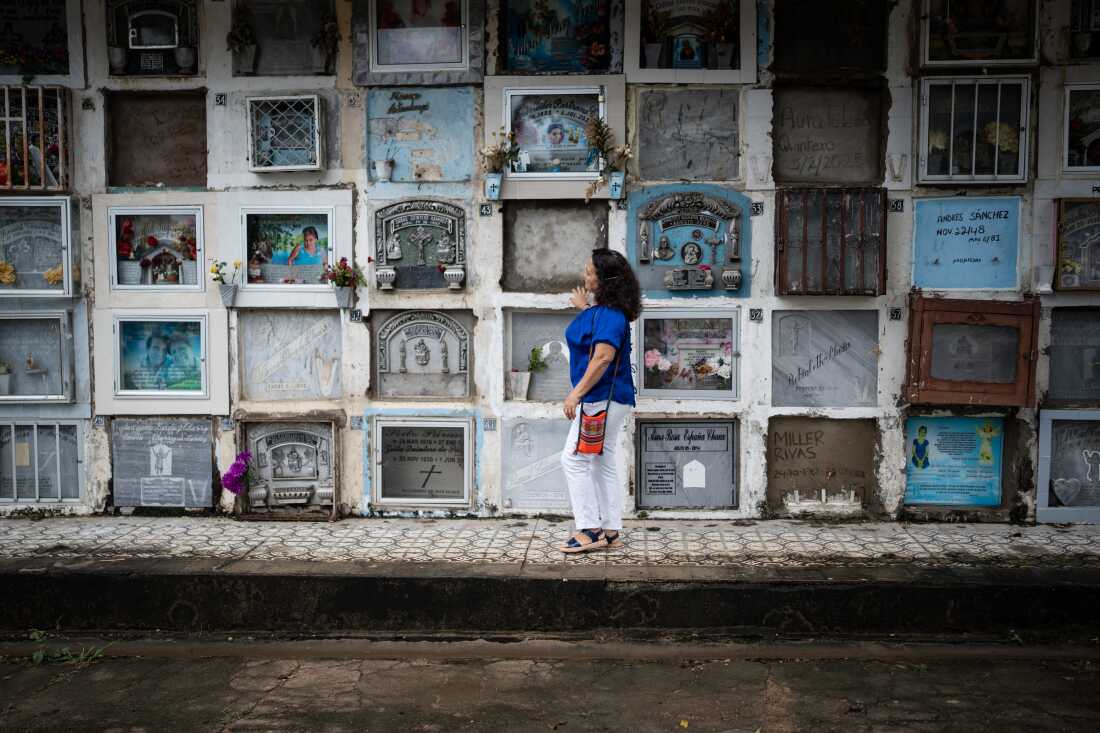Mario, a former member of the navy linked to Colombia’s “false positives” scandal, joins forensic work at Neiva’s Central Cemetery on April 30, 2025 — a part of a Particular Jurisdiction for Peace (JEP) mandated effort to revive justice and help victims. Picture: Nathalia Angarita for NPR
Nathalia Angarita for NPR
disguise caption
toggle caption
Nathalia Angarita for NPR
NEIVA, Colombia – As a authorities job pressure digs up mass graves within the seek for civilians illegally executed throughout Colombia’s guerrilla battle, they’re getting some hands-on assist from the perpetrators of those struggle crimes.
In a primary for Colombia three former military troopers, sporting white protecting fits and armed with trowels and buckets, spent 10 days alongside forensic specialists excavating filth, eradicating bones and bits of clothes, and bagging up the stays of individuals killed throughout the struggle.
“These were atrocities that never should have happened,” mentioned one of many troopers throughout a mid-day break within the exhumations at a cemetery within the central Colombian metropolis of Neiva.
The soldier, a former lieutenant colonel, requested to be recognized solely by his first title, Mario, for worry of reprisals. He admitted that throughout the mid-2000s troopers underneath his command shot useless 63 civilians and reported them as guerrillas killed in motion.
Mario and different ex-soldiers participating within the exhumations have struck a cope with Colombia’s struggle crimes tribunal, The court docket, which can also be investigating atrocities by the guerrillas, was arrange underneath a 2016 peace treaty that ended a lot of the preventing.
Accused former combatants who refuse to cooperate withstand 20 years behind bars. However those that confess and make reparations – by offering info on how and why the murders came about and the place the useless could also be buried, performing social work, and apologizing to kinfolk of the victims – can keep away from jail. As an alternative, they may obtain sentences of 5 to eight years of what the court docket calls “restricted liberties” however has but to outline.
The previous troopers started helping within the exhumations in Neiva final month and can proceed in cemeteries across the nation the place a lot of the victims are considered buried.

Flooded Central Cemetery in Neiva, Huila, Colombia, on April 30, 2025.
Nathalia Angarita for NPR
disguise caption
toggle caption
Nathalia Angarita for NPR

Alejandro Ramelli, president of Jurisdicción Especial para la Paz (JEP – The Particular Jurisdiction for Peace) in his workplace in Bogota, Colombia, on Could 5, 2025.
Nathalia Angarita for NPR
disguise caption
toggle caption
Nathalia Angarita for NPR
“I think the message is very important because it’s the first time in Colombia that the criminals are looking for the victims in the cemeteries,” mentioned Choose Alejandro Ramelli Arteaga, President of the struggle crimes tribunal, formally generally known as the Particular Jurisdiction for Peace (JEP).
Drawing parallels to the Vietnam Struggle, Mario says that Colombian officers like himself got here underneath fierce stress from the highest brass to run up the physique depend. Failure may derail their careers whereas complying may result in promotions, additional trip time, and different perks.
However the coverage led to huge abuses as troopers rounded up farmers, unemployed males, and even youngsters. Then, the detainees have been executed, wearing insurgent uniforms, and reported as fight kills with many buried in nameless graves in cemeteries.
“In their eagerness to show results, soldiers grabbed innocent people and killed them,” Mario instructed NPR. Requested about his personal response to the atrocities dedicated by troops he commanded, he replied: “It became so widespread that it seemed almost normal.”

A former member of the navy chisels open a grave on the Central Cemetery in Neiva, Huila, Colombia, April 30, 2025.
Nathalia Angarita for NPR
disguise caption
toggle caption
Nathalia Angarita for NPR

Mario, a former member of the navy participates in forensic actions as a part of the sanctions of the JEP, as a restorative measure with the victims, within the Central Cemetery of Neiva, Huila, Colombia, on April 30, 2025.
Nathalia Angarita for NPR
disguise caption
toggle caption
Nathalia Angarita for NPR
The struggle crimes tribunal discovered that the military illegally killed greater than 6,400 civilians between 2002 and 2008, a interval by which the U.S.-backed Colombian navy carried out huge offensive in opposition to the rebels. The executions, extensively generally known as “false positives,” , stay an enormous stain on the military’s repute.
“It was certainly one of the most – if not the most – atrocious crimes committed during the armed conflict in Colombia,” Juanita Goebertus, a former Colombian congresswoman who took half within the peace negotiations with the guerrillas and now heads the Americas Division of Human Rights Watch, instructed NPR.
Now, former troopers serving to with the exhumations are getting a stark have a look at the injury they’ve performed. In Neiva, they spent as much as 10 hours per day within the tropical solar getting their arms soiled within the cemetery soil as they assisted the forensic specialists. However their efforts additionally function a sort of remedy as they attempt to make amends.
After utilizing a hammer and chisel to crack open a crypt holding the stays of a struggle sufferer, one former soldier, who requested to stay nameless, mentioned: “This is helping me to get my life together.”
Complicating these efforts is the truth that lots of the useless have been merely dumped into swiftly dug mass graves with no identification. Diego Sevilla, who heads the federal government forensic staff in Neiva, factors to a web site within the cemetery that was thought to carry the stays of six individuals. However his staff discovered 12 skulls which means that not less than 12 individuals are buried there.
“The bodies are all mixed up,” Sevilla says.

Yanet Bermúdez, whose son disappeared in 2008 throughout Colombia’s armed battle, wears a shirt that claims, “I am also looking for you and waiting for you”, Central Cemetery in Neiva, Huila, on April 30, 2025.
Nathalia Angarita for NPR
disguise caption
toggle caption
Nathalia Angarita for NPR

Yolanda Rocha, whose brother was forcibly disappeared, searches for his stays on the Central Cemetery in Neiva, Huila, Colombia, on April 30, 2025.
Nathalia Angarita for NPR
disguise caption
toggle caption
Nathalia Angarita for NPR
Kin of the victims have been intently monitoring the exhumations hoping for details about their family members. They embody Yolanda Rocha, who mentioned her 15-year-old brother was one of many “false positives” and could also be buried right here. She talked to among the ex-soldiers, who expressed deep remorse.
“It was very difficult,” Rocha mentioned of these encounters. “You want the truth but you it’s like opening up an old wound.”
Comparable exhumations – with assist from ex-soldiers – will quickly begin in different Colombian cemeteries. However after 10 days in Neiva, the forensic staff wrapped up the primary section of its work by holding a ceremony to honor the useless.
Sevilla, the staff chief, recited a poem. Others solemnly place flowers atop the luggage of stays. Lastly, Mario, the previous military officer whose males killed 63 civilians, stepped ahead.
“Let’s hope this never happens again,” he mentioned, “because the pain this has caused is immense.”

Former troopers concerned in extrajudicial killings be a part of members of Colombia’s peace tribunal (JEP) and the Unit for the Seek for Disappeared Individuals (UBPD) in a symbolic ceremony marking the tip of exhumations on the Central Cemetery in Neiva, Huila, on April 30, 2025.
Nathalia Angarita for NPR
disguise caption
toggle caption
Nathalia Angarita for NPR




